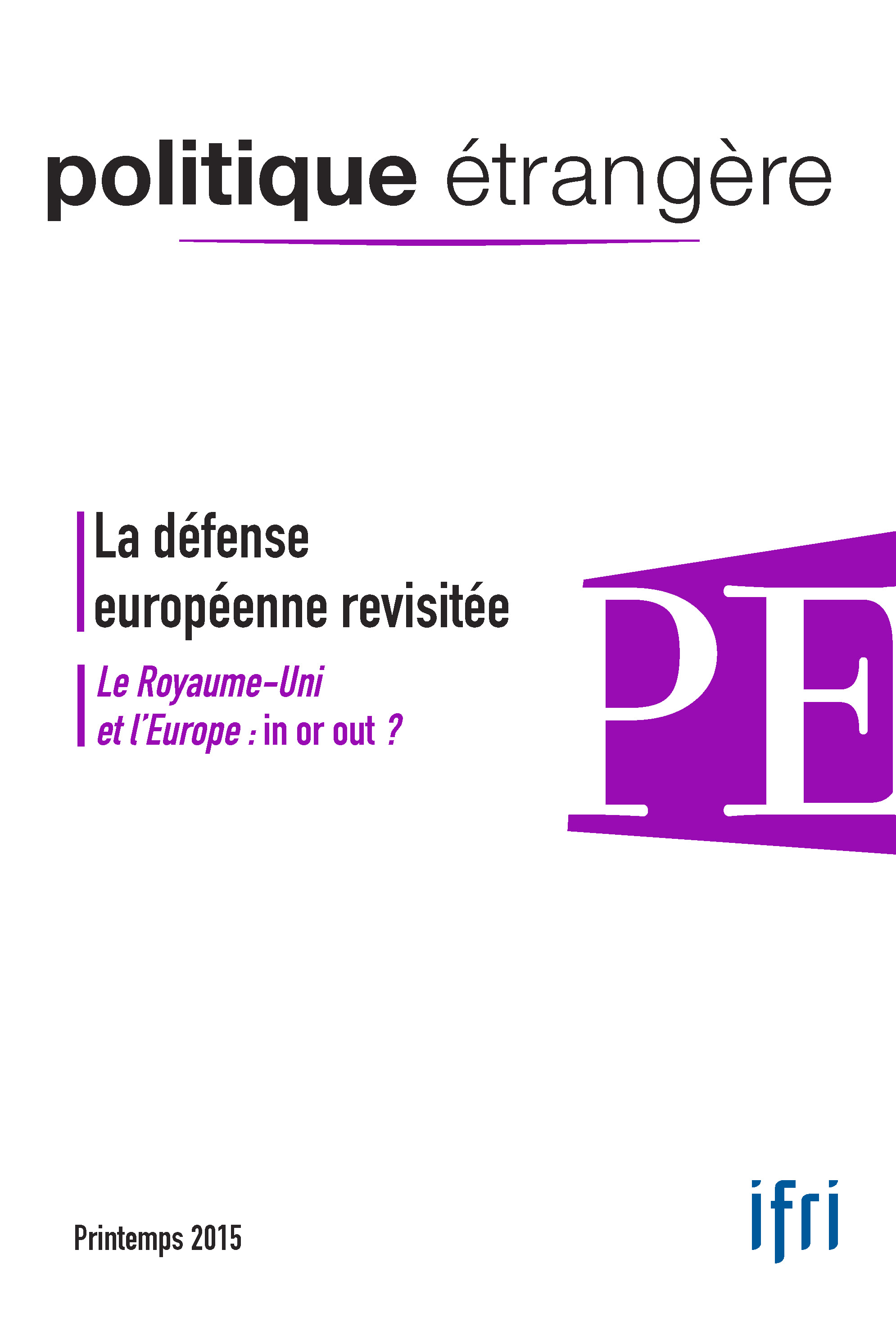European Defense Revisited / The United Kingdom and the EU: in or out?

FOCUS European Defense Revisited
Finally Something New in European Defense by Vivien Pertusot
Could Differentiated Integration Unblock the CSDP? by Ronja Kempin and Ronja Scheler
“Minilateralism”: A New Form of Defense Cooperation by Alice Pannier
Sharing Military Capabilities: Dead-End or Future of Defense? by Jon Rahbek-Clemmensen and Sten Rynning
COUNTERPOINT The United Kingdom and the EU: in or out?
Europe’s English Patient by Alain Lamassoure (read the article in French)
Would Europe, Freed from the Perfidious Albion, Lose its Way? by Philippe Moreau Defarges
CURRENT AFFAIRS
Afghanistan’s Difficult Transition by Jean-Luc Racine
Tunisia’s Armed Forces and Democratic Transition by Mourad Chabbi
BAROMETER
Australia: A New Strategy for a Medium-Size Power by Tanguy Struye de Swielande, Bruno Hellendorff and Alexia Honoré
The United States - South Korea Military Alliance in Question by Rémy Hémez
Volcanic Activity and Nuclear Security in Japan by Jean-François Heimburger
DEBATE
Crimea: The Contradictions of Russia’s Line by Jean-Baptiste Jeangène Vilmer (read the article in French)
The Western Balkans and the Failure of European Enlargement by Jean-Arnault Dérens
BOOK REVIEWS
World Order by Henry Kissinger, review by Tristan Aureau
You can read in French the Editorial of Politique étrangère, vol. 80, n° 1, printemps 2015
You can read in French the Book reviews of Politique étrangère, vol. 80, n° 1, printemps 2015

Available in:
Regions and themes
ISBN / ISSN
Share
Related centers and programs
Discover our other research centers and programsFind out more
Discover all our analyses"Iron Swords" A Military Analysis of Israel's War in Gaza
On October 7, 2023, Hamas' attack, dubbed “Al-Aqsa Flood,” caused a major shock and led Israel to launch the longest war in its history. Operation “Iron Swords” was notable for its unprecedented intensity, both in terms of the massive ground forces deployed and the firepower used.
Saudi Arabia’s Nuclear Temptations. Lessons Learned from Regional Instability
Saudi Arabia’s integration in the international arena and regional stability, notably through reducing its dependence on fossil energies, are crucial elements for the success of the Kingdom’s Vision 2030, the Crown Prince’s top priority. However, Mohammed bin Salman’s declarations in 2018 and 2021, indicating that “if Iran develops a nuclear bomb, we will follow suit as soon as possible”, combined with the recent strikes on key Iranian nuclear facilities, do not bode well for the future of the Kingdom, the region and the non-proliferation regime at large.
The Future of Air Superiority. Command of the Air in High Intensity Warfare
Air superiority, understood as control of the air, is a cornerstone of the Western art of warfare. It is a decisive condition, albeit not sufficient by itself, to achieve military victory, as it enables the concentration of air power toward the achievement of wider strategic objectives and protects other components from unbearable attrition levels. It is best achieved through the offensive use of air power in a joint effort to neutralize the enemy’s air power.
Europe Uncovered?
As Russia continues to threaten Europe, the Trump administration is making no secret of its desire to withdraw—at least partially—from the defense of the Old
Continent in order to focus on strategic competition with China. It is thus putting pressure on its European allies to increase their investment in the military sector. The NATO Summit in The Hague in June 2025 resulted in ambitious commitments by member states to increase their defense spending.









